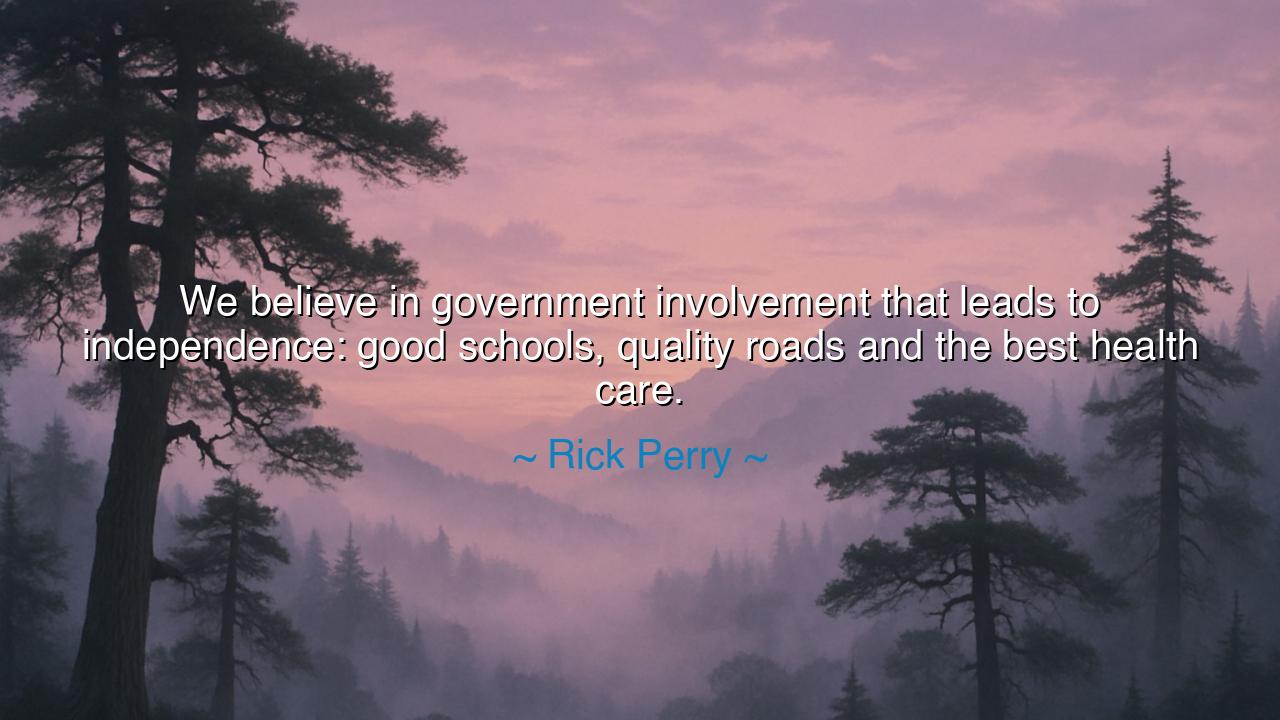
We believe in government involvement that leads to independence:
We believe in government involvement that leads to independence: good schools, quality roads and the best health care.






The Path to True Independence Through the Work of Many
Hear the words of Rick Perry, spoken in an age of division but rooted in an ancient truth:
“We believe in government involvement that leads to independence: good schools, quality roads and the best health care.”
At first, these words may seem practical, the language of policy and governance. Yet beneath them lies a profound philosophy—an understanding as old as civilization itself—that true independence is not the absence of structure, but the presence of foundation. Perry’s vision reminds us that a people cannot rise in freedom if they are denied the means to stand tall. For liberty is not sustained by neglect, but by nurturing—by roads that connect, schools that enlighten, and healing that restores.
The Meaning of Guided Freedom
The ancients taught that freedom is not chaos, but order rightly balanced. In the days of Athens, the polis thrived because its citizens shared in both duty and privilege. The city built roads for trade, schools for learning, and temples for the soul. Yet each citizen was expected to act with virtue, to use those blessings to live not in dependence, but in self-reliance.
So too does Perry’s saying draw from this eternal harmony. He calls not for domination by the state, but for guidance—for a form of governance that builds the scaffolding of opportunity so that each person may climb to their own height. His words speak to the covenant between a people and their rulers: that government exists not to carry the individual, but to prepare the ground upon which the individual may walk freely.
The Tools of Freedom
When Perry names “good schools, quality roads, and the best health care,” he names the tools of a thriving republic. A school is not merely a building of books and desks—it is a forge of the mind, where the child learns to master thought and choice. A road is not only stone and tar—it is the lifeline that binds community to community, commerce to prosperity. And health care, when it serves all with dignity, is not charity—it is the preservation of the body that allows the spirit to labor, to love, to create.
These are not luxuries, but the pillars of independence itself. For how can a person be free who is sick without healing, ignorant without teaching, or isolated without the roads of connection? Perry’s vision, then, is the ancient wisdom reborn: that freedom grows where infrastructure meets virtue, and that the strength of a nation depends upon the well-being of its people.
The Ancient Parallel
Consider the story of Emperor Ashoka, who once ruled vast lands in ancient India. After years of conquest, he turned away from war to build a different kind of empire—one founded on compassion and welfare. He constructed hospitals, planted trees along roads for travelers, and established centers of learning for the poor. His reign endured not because of fear, but because his people grew strong and wise. Ashoka understood, as Perry does, that when rulers invest in their people’s growth, the nation becomes unshakable.
This lesson echoes across history: the mightiest nations are not those with the largest armies, but those with educated minds, sound bodies, and open roads. The strength of a country lies in its citizens’ capacity to act, not merely their freedom to wish.
The Paradox of Independence Through Support
To the unwise, the idea that government involvement could lead to independence may seem a contradiction. But to the discerning, it is the perfect balance between nurture and freedom. A farmer who waters the field does not enslave the seed; he prepares it for growth. Likewise, the state that invests in education and health does not bind its people—it frees them from the prison of ignorance and weakness.
True independence is not born from neglect, but from empowerment. It is the moment when the child, having been taught and cared for, takes their first step alone. Thus, the wise ruler builds the systems that strengthen, not control, the spirit of the people.
The Lesson for Our Time
Let this be a teaching to all who listen: independence is a harvest, and it must be cultivated. If you wish for freedom, build the soil of learning. If you desire prosperity, pave the roads that connect. If you dream of greatness, care for the health of every citizen. For a nation is not free because it shouts of liberty—it is free because its people have the strength and wisdom to live it.
Each of us shares in this work. The teacher who shapes the mind, the builder who lays the road, the healer who saves a life—all are laborers in the grand temple of freedom. To support such work is not to surrender your liberty—it is to invest in the independence of all.
The Eternal Truth
Thus, Rick Perry’s words echo through the corridors of time as both reminder and prophecy: freedom without foundation is fragile. The hands that build schools, roads, and hospitals are the same hands that secure liberty’s future. Governments that empower their people create nations that need them less; those that ignore them breed dependence and despair.
So let every generation remember this balance: structure serves freedom, and freedom sustains structure. The wise ruler and the wise citizen alike must build, nurture, and protect the pathways that lead to independence. For only when the mind is educated, the body is healed, and the road is open, can the human spirit truly rise—and walk, unbound, toward destiny.






AAdministratorAdministrator
Welcome, honored guests. Please leave a comment, we will respond soon